By Maja Sidzinska · Tuesday, December 4, 2012 As an occasional feature on TELOSscope, we highlight a past Telos article whose critical insights continue to illuminate our thinking and challenge our assumptions. Today, Maja Sidzinska looks at Alessandro Pizzorno’s “On the Rationality of Democratic Choice” from Telos 63 (Spring 1985).
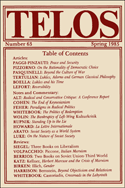 To presume that individual interests precede political action is not only to place the proverbial cart before the horse, it is to formulate a theory of social agency based on a belief in sequential phenomena sans justification for the particular sequence proposed. In “On the Rationality of Democratic Choice,” Alessandro Pizzorno argues that the system of political actions and interests is an annular one, which is why utilitarian and rational choice theories lack sufficient explanatory value. He proposes the goal of affirmation of socio-political identity is an alternative explanation of political action that does not speak the traditional language of costs and benefits, as that language is housed within a universalizing framework that doesn’t reflect reality. To presume that individual interests precede political action is not only to place the proverbial cart before the horse, it is to formulate a theory of social agency based on a belief in sequential phenomena sans justification for the particular sequence proposed. In “On the Rationality of Democratic Choice,” Alessandro Pizzorno argues that the system of political actions and interests is an annular one, which is why utilitarian and rational choice theories lack sufficient explanatory value. He proposes the goal of affirmation of socio-political identity is an alternative explanation of political action that does not speak the traditional language of costs and benefits, as that language is housed within a universalizing framework that doesn’t reflect reality.
Continue reading →
By Telos Press · Monday, December 3, 2012 The following review of Ernst Jünger’s The Adventurous Heart: Figures and Capriccios appeared in the November edition of The Midwest Book Review‘s Small Press Bookwatch.
 Psychology is the study of human thought and processes, and all around the world people have brought different perspectives together for a better and more complete understanding of it all. The Adventurous Heart: Figures and Capriccios is an English translation of the 1938 German psychological writer Ernst Jünger who wrote on his perspective of the mind and what we seek in life, touching on the nature of intuition. Revered throughout the literary and psychological international communities, The Adventurous Heart is a strong read for those who want a better understanding of the man who saw much in his time of turmoil. Psychology is the study of human thought and processes, and all around the world people have brought different perspectives together for a better and more complete understanding of it all. The Adventurous Heart: Figures and Capriccios is an English translation of the 1938 German psychological writer Ernst Jünger who wrote on his perspective of the mind and what we seek in life, touching on the nature of intuition. Revered throughout the literary and psychological international communities, The Adventurous Heart is a strong read for those who want a better understanding of the man who saw much in his time of turmoil.
Ernst Jünger’s The Adventurous Heart is available for purchase here.
Continue reading →
By Yonathan Listik · Tuesday, November 27, 2012 As an occasional feature on TELOSscope, we highlight a past Telos article whose critical insights continue to illuminate our thinking and challenge our assumptions. Today, Yonathan Listik looks at Georg Lukács’s “The Old Culture and the New Culture” from Telos 5 (Spring 1970).
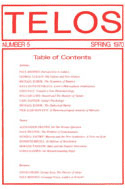 It would be simplistic to argue that behind the Marxist critiques of capitalist society there was only an objective intention simply to improve its effectiveness and avoid the political complications found in capitalist society. Despite its strict scientific tone, Marxism still carries a heavily moral intention. This is what Georg Lukács comes to argue in this essay on culture. In his analysis of capitalist cultural structure and its many differences from capitalist reality, Lukács points to what he regards as the ultimate goal behind communism: a new cultural order. It would be simplistic to argue that behind the Marxist critiques of capitalist society there was only an objective intention simply to improve its effectiveness and avoid the political complications found in capitalist society. Despite its strict scientific tone, Marxism still carries a heavily moral intention. This is what Georg Lukács comes to argue in this essay on culture. In his analysis of capitalist cultural structure and its many differences from capitalist reality, Lukács points to what he regards as the ultimate goal behind communism: a new cultural order.
Continue reading →
By Sevgi Doğan · Monday, November 26, 2012 This paper was presented at Telos in Europe: The L’Aquila Conference, held on September 7-9, 2012, in L’Aquila, Italy.
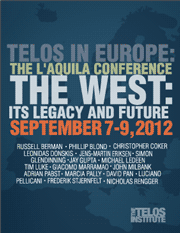 The argument of this paper is inspired by the actual problem of the individual in the modern state, in other words, the relationship between the political life and the individual, or the relation of the individual with politics. The thesis would claim that the individual as one of the fundamental features of modern times does not exist—or is not considered—as political agent although the modern political institution is based on the existence of the individual with its economic, social, and political rights. In this context, the individual exists only as consumer both for him/herself and for another (capitalist) and as a producer for another (capitalist) but not as a creator for him/herself. Marx talks about the production and consumption dialectic in the “Introduction” to Grundrisse (1858, published 1939). In this context a brief survey is presented here of some well-known early writings of Marx in an effort to outline how this dialectic is revealed for the difference between Marx’s and Hegel’s philosophical perspectives of the individual existence. The statement claiming that Marx does not discuss the concept of individual as Hegel does is a delusion. The argument of this paper is inspired by the actual problem of the individual in the modern state, in other words, the relationship between the political life and the individual, or the relation of the individual with politics. The thesis would claim that the individual as one of the fundamental features of modern times does not exist—or is not considered—as political agent although the modern political institution is based on the existence of the individual with its economic, social, and political rights. In this context, the individual exists only as consumer both for him/herself and for another (capitalist) and as a producer for another (capitalist) but not as a creator for him/herself. Marx talks about the production and consumption dialectic in the “Introduction” to Grundrisse (1858, published 1939). In this context a brief survey is presented here of some well-known early writings of Marx in an effort to outline how this dialectic is revealed for the difference between Marx’s and Hegel’s philosophical perspectives of the individual existence. The statement claiming that Marx does not discuss the concept of individual as Hegel does is a delusion.
Continue reading →
By Maja Sidzinska · Tuesday, November 20, 2012 As an occasional feature on TELOSscope, we highlight a past Telos article whose critical insights continue to illuminate our thinking and challenge our assumptions. Today, Maja Sidzinska looks at Joan Landes’s “Feminism and the Internationals” from Telos 49 (Fall 1981).
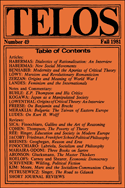 Although 2012 is being hailed as the new Year of the Woman and women’s votes were solicited and cited as pivotal to the outcome of the U.S. presidential election, Joan Landes’s 1981 article “Feminism and the Internationals” provides a timely reminder about the strategic ways that women’s and feminist movements have been deployed in service of political agendas in body politics past. Landes illustrates the historical subordination of women’s and feminist concerns in socialist paradigms and states, shows that the personal was treated as apolitical, and alludes to male epistemic authority as begetting these developments. From the vantage point of Marxist socialism, the problem with feminism is that it undermines the unified class struggle by introducing a competing concern—gender—that threatens the cohesion of the socialist movement. Although 2012 is being hailed as the new Year of the Woman and women’s votes were solicited and cited as pivotal to the outcome of the U.S. presidential election, Joan Landes’s 1981 article “Feminism and the Internationals” provides a timely reminder about the strategic ways that women’s and feminist movements have been deployed in service of political agendas in body politics past. Landes illustrates the historical subordination of women’s and feminist concerns in socialist paradigms and states, shows that the personal was treated as apolitical, and alludes to male epistemic authority as begetting these developments. From the vantage point of Marxist socialism, the problem with feminism is that it undermines the unified class struggle by introducing a competing concern—gender—that threatens the cohesion of the socialist movement.
Continue reading →
By Kyle Gingerich Hiebert · Monday, October 29, 2012 Kyle Gingerich Hiebert’s “The Architectonics of Hope: Apocalyptic Convergences and Constellations of Violence in Carl Schmitt and Johann Baptist Metz” appears in Telos 160 (Fall 2012). Read the full version online at the Telos Online website, or purchase a print copy of the issue here.
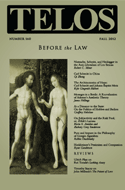 This essay traces the apocalyptic re-emergence of political theology in late modernity in the work of the jurist Carl Schmitt and the theologian Johann Baptist Metz. Broadly speaking, the intellectual fault line between these two German Catholics can be provisionally drawn with reference to Hegel. On the one hand, Schmitt¹s lineage can be traced back through the conservative Catholic political philosophers of the counterrevolution (Bonald, de Maistre, and Cortés) to what amounts to, in very broad strokes, a political theology of the Hegelian Right. On the other hand, Metz¹s sympathies in his development of the new political theology clearly lie with the revisionary Marxists of the Frankfurt School (Adorno, Benjamin, and Bloch), which binds his intellectual heritage, again in very broad strokes, to the Hegelian Left. This way of putting the matter quite easily lends itself to interpretations that argue the relationship between Schmitt and Metz is straightforwardly oppositional. While perhaps conceptually useful, I argue that any easy conservative/critical dichotomy here obscures as much as it illuminates because it proffers too undifferentiated an account of the interrelationship between Schmitt and Metz. Alternatively, I suggest that the apocalyptic tone that infuses their respective accounts of political theology is the most adequate key for understanding how they function as different expressions of what I call an architectonics of hope; a reconfiguration of political theology that is structural in nature, animated by a thoroughly negative theological anthropology and that tragically acquiesces to the ongoing necessity of violence. In the end, then, Schmitt and Metz stand much closer to each other than currently realized. This essay traces the apocalyptic re-emergence of political theology in late modernity in the work of the jurist Carl Schmitt and the theologian Johann Baptist Metz. Broadly speaking, the intellectual fault line between these two German Catholics can be provisionally drawn with reference to Hegel. On the one hand, Schmitt¹s lineage can be traced back through the conservative Catholic political philosophers of the counterrevolution (Bonald, de Maistre, and Cortés) to what amounts to, in very broad strokes, a political theology of the Hegelian Right. On the other hand, Metz¹s sympathies in his development of the new political theology clearly lie with the revisionary Marxists of the Frankfurt School (Adorno, Benjamin, and Bloch), which binds his intellectual heritage, again in very broad strokes, to the Hegelian Left. This way of putting the matter quite easily lends itself to interpretations that argue the relationship between Schmitt and Metz is straightforwardly oppositional. While perhaps conceptually useful, I argue that any easy conservative/critical dichotomy here obscures as much as it illuminates because it proffers too undifferentiated an account of the interrelationship between Schmitt and Metz. Alternatively, I suggest that the apocalyptic tone that infuses their respective accounts of political theology is the most adequate key for understanding how they function as different expressions of what I call an architectonics of hope; a reconfiguration of political theology that is structural in nature, animated by a thoroughly negative theological anthropology and that tragically acquiesces to the ongoing necessity of violence. In the end, then, Schmitt and Metz stand much closer to each other than currently realized.
Continue reading →
|
|
 To presume that individual interests precede political action is not only to place the proverbial cart before the horse, it is to formulate a theory of social agency based on a belief in sequential phenomena sans justification for the particular sequence proposed. In “On the Rationality of Democratic Choice,” Alessandro Pizzorno argues that the system of political actions and interests is an annular one, which is why utilitarian and rational choice theories lack sufficient explanatory value. He proposes the goal of affirmation of socio-political identity is an alternative explanation of political action that does not speak the traditional language of costs and benefits, as that language is housed within a universalizing framework that doesn’t reflect reality.
To presume that individual interests precede political action is not only to place the proverbial cart before the horse, it is to formulate a theory of social agency based on a belief in sequential phenomena sans justification for the particular sequence proposed. In “On the Rationality of Democratic Choice,” Alessandro Pizzorno argues that the system of political actions and interests is an annular one, which is why utilitarian and rational choice theories lack sufficient explanatory value. He proposes the goal of affirmation of socio-political identity is an alternative explanation of political action that does not speak the traditional language of costs and benefits, as that language is housed within a universalizing framework that doesn’t reflect reality.  Psychology is the study of human thought and processes, and all around the world people have brought different perspectives together for a better and more complete understanding of it all. The Adventurous Heart: Figures and Capriccios is an English translation of the 1938 German psychological writer Ernst Jünger who wrote on his perspective of the mind and what we seek in life, touching on the nature of intuition. Revered throughout the literary and psychological international communities, The Adventurous Heart is a strong read for those who want a better understanding of the man who saw much in his time of turmoil.
Psychology is the study of human thought and processes, and all around the world people have brought different perspectives together for a better and more complete understanding of it all. The Adventurous Heart: Figures and Capriccios is an English translation of the 1938 German psychological writer Ernst Jünger who wrote on his perspective of the mind and what we seek in life, touching on the nature of intuition. Revered throughout the literary and psychological international communities, The Adventurous Heart is a strong read for those who want a better understanding of the man who saw much in his time of turmoil. It would be simplistic to argue that behind the Marxist critiques of capitalist society there was only an objective intention simply to improve its effectiveness and avoid the political complications found in capitalist society. Despite its strict scientific tone, Marxism still carries a heavily moral intention. This is what Georg Lukács comes to argue in this essay on culture. In his analysis of capitalist cultural structure and its many differences from capitalist reality, Lukács points to what he regards as the ultimate goal behind communism: a new cultural order.
It would be simplistic to argue that behind the Marxist critiques of capitalist society there was only an objective intention simply to improve its effectiveness and avoid the political complications found in capitalist society. Despite its strict scientific tone, Marxism still carries a heavily moral intention. This is what Georg Lukács comes to argue in this essay on culture. In his analysis of capitalist cultural structure and its many differences from capitalist reality, Lukács points to what he regards as the ultimate goal behind communism: a new cultural order.  The argument of this paper is inspired by the actual problem of the individual in the modern state, in other words, the relationship between the political life and the individual, or the relation of the individual with politics. The thesis would claim that the individual as one of the fundamental features of modern times does not exist—or is not considered—as political agent although the modern political institution is based on the existence of the individual with its economic, social, and political rights. In this context, the individual exists only as consumer both for him/herself and for another (capitalist) and as a producer for another (capitalist) but not as a creator for him/herself. Marx talks about the production and consumption dialectic in the “Introduction” to Grundrisse (1858, published 1939). In this context a brief survey is presented here of some well-known early writings of Marx in an effort to outline how this dialectic is revealed for the difference between Marx’s and Hegel’s philosophical perspectives of the individual existence. The statement claiming that Marx does not discuss the concept of individual as Hegel does is a delusion.
The argument of this paper is inspired by the actual problem of the individual in the modern state, in other words, the relationship between the political life and the individual, or the relation of the individual with politics. The thesis would claim that the individual as one of the fundamental features of modern times does not exist—or is not considered—as political agent although the modern political institution is based on the existence of the individual with its economic, social, and political rights. In this context, the individual exists only as consumer both for him/herself and for another (capitalist) and as a producer for another (capitalist) but not as a creator for him/herself. Marx talks about the production and consumption dialectic in the “Introduction” to Grundrisse (1858, published 1939). In this context a brief survey is presented here of some well-known early writings of Marx in an effort to outline how this dialectic is revealed for the difference between Marx’s and Hegel’s philosophical perspectives of the individual existence. The statement claiming that Marx does not discuss the concept of individual as Hegel does is a delusion.  Although 2012 is being hailed as the new Year of the Woman and women’s votes were solicited and cited as pivotal to the outcome of the U.S. presidential election, Joan Landes’s 1981 article “Feminism and the Internationals” provides a timely reminder about the strategic ways that women’s and feminist movements have been deployed in service of political agendas in body politics past. Landes illustrates the historical subordination of women’s and feminist concerns in socialist paradigms and states, shows that the personal was treated as apolitical, and alludes to male epistemic authority as begetting these developments. From the vantage point of Marxist socialism, the problem with feminism is that it undermines the unified class struggle by introducing a competing concern—gender—that threatens the cohesion of the socialist movement.
Although 2012 is being hailed as the new Year of the Woman and women’s votes were solicited and cited as pivotal to the outcome of the U.S. presidential election, Joan Landes’s 1981 article “Feminism and the Internationals” provides a timely reminder about the strategic ways that women’s and feminist movements have been deployed in service of political agendas in body politics past. Landes illustrates the historical subordination of women’s and feminist concerns in socialist paradigms and states, shows that the personal was treated as apolitical, and alludes to male epistemic authority as begetting these developments. From the vantage point of Marxist socialism, the problem with feminism is that it undermines the unified class struggle by introducing a competing concern—gender—that threatens the cohesion of the socialist movement.  This essay traces the apocalyptic re-emergence of political theology in late modernity in the work of the jurist Carl Schmitt and the theologian Johann Baptist Metz. Broadly speaking, the intellectual fault line between these two German Catholics can be provisionally drawn with reference to Hegel. On the one hand, Schmitt¹s lineage can be traced back through the conservative Catholic political philosophers of the counterrevolution (Bonald, de Maistre, and Cortés) to what amounts to, in very broad strokes, a political theology of the Hegelian Right. On the other hand, Metz¹s sympathies in his development of the new political theology clearly lie with the revisionary Marxists of the Frankfurt School (Adorno, Benjamin, and Bloch), which binds his intellectual heritage, again in very broad strokes, to the Hegelian Left. This way of putting the matter quite easily lends itself to interpretations that argue the relationship between Schmitt and Metz is straightforwardly oppositional. While perhaps conceptually useful, I argue that any easy conservative/critical dichotomy here obscures as much as it illuminates because it proffers too undifferentiated an account of the interrelationship between Schmitt and Metz. Alternatively, I suggest that the apocalyptic tone that infuses their respective accounts of political theology is the most adequate key for understanding how they function as different expressions of what I call an architectonics of hope; a reconfiguration of political theology that is structural in nature, animated by a thoroughly negative theological anthropology and that tragically acquiesces to the ongoing necessity of violence. In the end, then, Schmitt and Metz stand much closer to each other than currently realized.
This essay traces the apocalyptic re-emergence of political theology in late modernity in the work of the jurist Carl Schmitt and the theologian Johann Baptist Metz. Broadly speaking, the intellectual fault line between these two German Catholics can be provisionally drawn with reference to Hegel. On the one hand, Schmitt¹s lineage can be traced back through the conservative Catholic political philosophers of the counterrevolution (Bonald, de Maistre, and Cortés) to what amounts to, in very broad strokes, a political theology of the Hegelian Right. On the other hand, Metz¹s sympathies in his development of the new political theology clearly lie with the revisionary Marxists of the Frankfurt School (Adorno, Benjamin, and Bloch), which binds his intellectual heritage, again in very broad strokes, to the Hegelian Left. This way of putting the matter quite easily lends itself to interpretations that argue the relationship between Schmitt and Metz is straightforwardly oppositional. While perhaps conceptually useful, I argue that any easy conservative/critical dichotomy here obscures as much as it illuminates because it proffers too undifferentiated an account of the interrelationship between Schmitt and Metz. Alternatively, I suggest that the apocalyptic tone that infuses their respective accounts of political theology is the most adequate key for understanding how they function as different expressions of what I call an architectonics of hope; a reconfiguration of political theology that is structural in nature, animated by a thoroughly negative theological anthropology and that tragically acquiesces to the ongoing necessity of violence. In the end, then, Schmitt and Metz stand much closer to each other than currently realized. 

